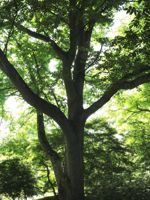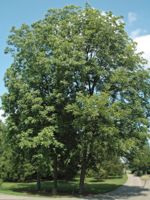Mon-Fri 9am - 5pm Mountain time
Manchurian Walnut vs Hardy Pecan
Juglans mandshurica
Carya illinoinensis
NOT AVAILABLE THIS SEASON - MIGHT RETURN
NOT AVAILABLE THIS SEASON - MIGHT RETURN
Manchurian Walnut is a large, broad and often multi-stemmed tree with ornamental qualities. This tree produces large, thick-shelled nuts that ripen in the fall. These edible walnuts are reportedly difficult to crack open. They are useful for attracting wildlife, especially squirrels.
The Manchurian Walnut contains and exudes much lesser quantities of allelopathic compounds, such as juglone (common to walnuts), that may prevent or impair growth of nearby plants. Therefore, it is commonly embraced as a safe walnut to plant.
There are reports of rare this species surviving winters to -45C with specimens growing and thriving in Alaska and Edmonton.
There is no regular supply of this species. It is rare and not produced each year.
Hardy Pecan trees are known for their edible nuts that ripen in late autumn. They can be eaten raw or cooked and can be used in a wide range of baked goods. If stored properly in a cool, dry location, they can be kept for up to 6 months in their shell. Trees tend to bear nuts at maturity, which occurs around 6 -10 years. The size and form of this tree also makes it a great shade or feature tree for your landscape.
For nut production, it is recommended that at least 2-3 are planted so that cross pollination can occur. In colder areas it is likely that nut production will be limited, especially in locations with late frosts and shorter growing seasons.
If exposed to high winds, Hardy Pecan is known to lose branches, but these can be used as firewood, or to smoke foods with a hickory flavour. Finding seed or seedlings of this tree is rare in Canada.
Note: plant this tree once. It will not respond well to transplanting.

